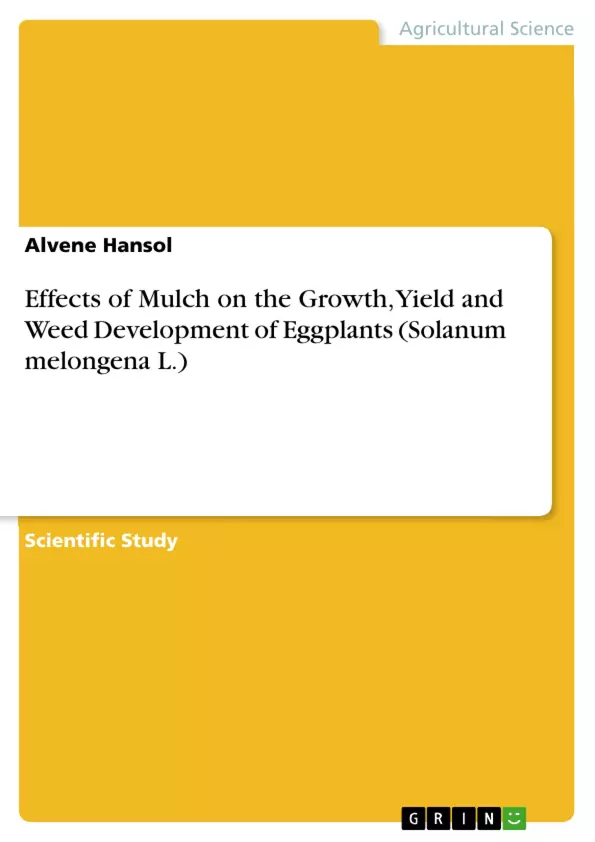The study aspires to compare two different plots with and without plastic mulch for growing eggplants. The study was conducted in order to find the answer on how to lessen weed development increasing the yield of crops and to identify the different species of weed and its population on eggplant. Specifically, the success of the research was based on the harvested fruit of the eggplant and the data gathered. The result from the gathered data shows that black plastic mulch obtained longer fruit length of 56.4 cm compared to the plot without black plastic mulch which has 22.5 cm. For weed height, plots with black plastic mulch obtained shorter length of 15.1 cm compared to the plot without plastic mulch which has 28.3 cm. For weed species, researchers identified 11 kind of species of weeds that grown in plot with black plastic mulch and plot without mulch and identify them. In terms of weed density, plots with black plastic mulch had lesser weed density compared to the plot without black plastic mulch. For the total yield, the plot with black plastic mulch have the highest total yield compared to plot without black plastic mulch. Marketable and non-marketable fruit was also obtained, plot with black plastic mulch have the highest marketable yield of 0.87 kg compared to control which only has 0.64 kg.
Based on the findings of the study, with the help of black plastic mulch, water, good management practice and vermicompost as fertilizer, the plot with black plastic mulch was effective in controlling the growth of weeds and increasing the yield of eggplant.
Table of Contents
- INTRODUCTION
- Background of the Study
- Statement of the Problem
- Objectives of the Study
- Importance of the Study
- Scope of Limitation
- Time and Place of the Study
- Methodology
- Treatments Used
- Location of the Study
- Land Preparation
- Mulching
- Transplanting
- Water Management
- Weed Management
- Pest Management
- Nutrient Management
- Harvesting
- Data Gathered
- Results and Discussion
- Height of Weeds
- Fruit Length
- Weed Species
- Weed Density
- Total Yield
- Marketable Yield
- Non-Marketable Yield
- SUMMARY, CONCLUSION, AND RECOMMENDATION
- Summary
- Conclusion
- Recommendation
- Review of Related Literature
- Literature Cited
- Appendices
Objectives and Key Themes
This research aims to investigate the effects of black plastic mulch on eggplant growth, yield, and weed development. It explores whether using plastic mulch can help reduce weed development and consequently increase crop yield. The research also seeks to identify and analyze the different types of weed species found in both mulched and non-mulched plots.
- Impact of Black Plastic Mulch on Eggplant Growth and Yield
- Weed Control and Mitigation Using Plastic Mulch
- Identification and Analysis of Weed Species
- Comparative Study of Mulched and Non-Mulched Plots
- Optimization of Eggplant Production Practices
Chapter Summaries
The introduction provides a background on the study, outlining the problem of weed development and its impact on eggplant yield. The objectives of the study are clearly stated, emphasizing the importance of exploring plastic mulch as a potential solution. The scope of the research and its limitations are also outlined, establishing the context for the investigation.
The methodology chapter details the experimental design, including the treatments used, location of the study, land preparation, mulching techniques, transplanting procedures, water management, weed control, pest management, nutrient application, harvesting process, and data collection methods. This chapter lays the groundwork for the empirical analysis presented later.
The results and discussion chapter presents the data collected on various parameters such as weed height, fruit length, weed species identification, weed density, total yield, marketable yield, and non-marketable yield. This section analyzes the findings in relation to the objectives, exploring the impact of plastic mulch on eggplant growth, yield, and weed development.
Keywords
This study focuses on the use of black plastic mulch as a sustainable and efficient practice to enhance eggplant production. Key concepts include weed management, eggplant yield, fruit length, weed species identification, weed density, and the comparative analysis of mulched and non-mulched plots. The research seeks to optimize agricultural practices and contribute to a more sustainable and profitable eggplant cultivation system.
- Arbeit zitieren
- Alvene Hansol (Autor:in), 2018, Effects of Mulch on the Growth, Yield and Weed Development of Eggplants (Solanum melongena L.), München, GRIN Verlag, https://www.hausarbeiten.de/document/520421


